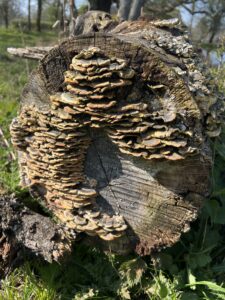Turkey tail (scientifically known as Trametes versicolor) is a type of mushroom that has been used in traditional medicine for centuries, particularly in Asian cultures like Traditional Chinese Medicine (TCM) and Japanese herbal medicine. Here are some of its medicinal benefits:
- Immune Support: Turkey tail contains polysaccharopeptides (PSP) and polysaccharides like beta-glucans, which have been shown to boost the immune system. These compounds stimulate the production of immune cells such as lymphocytes, macrophages, and natural killer cells, enhancing the body’s ability to defend against infections and diseases.
- Antioxidant Properties: The mushroom contains phenols and flavonoids, which possess strong antioxidant properties. Antioxidants help neutralize free radicals in the body, reducing oxidative stress and inflammation, and potentially lowering the risk of chronic diseases like cancer, heart disease, and diabetes.
- Anti-Cancer Effects: Research suggests that turkey tail may have anti-cancer properties. Studies have shown that its polysaccharides, particularly PSK (polysaccharide-K) and PSP, exhibit anti-tumor activities by inhibiting cancer cell growth, promoting apoptosis (cell death) in cancer cells, and enhancing the immune system’s ability to recognize and destroy cancer cells. Turkey tail extract is sometimes used as a complementary therapy alongside conventional cancer treatments like chemotherapy and radiation therapy.
- Digestive Health: Turkey tail contains prebiotic fibers that promote the growth of beneficial gut bacteria. Maintaining a healthy balance of gut flora is essential for digestion, nutrient absorption, and overall gastrointestinal health. Some research suggests that turkey tail may help alleviate symptoms of digestive disorders like irritable bowel syndrome (IBS) and inflammatory bowel disease (IBD).
- Antimicrobial Activity: Turkey tail has demonstrated antimicrobial properties against various bacteria, viruses, and fungi. Compounds found in the mushroom, such as lectins and peptides, exhibit antimicrobial effects by disrupting microbial cell membranes or interfering with their replication processes. This antimicrobial activity may help prevent or treat infections caused by pathogens.
- Liver Support: Some studies suggest that turkey tail may benefit liver health by protecting against liver damage and supporting liver function. Its antioxidant and anti-inflammatory properties help reduce oxidative stress and inflammation in the liver, which can occur due to factors like alcohol consumption, toxin exposure, or certain diseases.
- Respiratory Health: Turkey tail has been traditionally used to support respiratory health. It may help alleviate symptoms of respiratory infections, such as coughing and congestion, due to its immune-boosting and antimicrobial properties. Additionally, its anti-inflammatory effects may help reduce inflammation in the respiratory tract.
 It’s important to note that while turkey tail mushroom shows promising medicinal benefits, more research, including clinical trials, is needed to further understand its mechanisms of action and to confirm its efficacy and safety for various health conditions. Additionally, individuals should consult healthcare professionals before incorporating turkey tail or any other herbal supplement into their healthcare regimen, especially if they have underlying health conditions or are taking medications.
It’s important to note that while turkey tail mushroom shows promising medicinal benefits, more research, including clinical trials, is needed to further understand its mechanisms of action and to confirm its efficacy and safety for various health conditions. Additionally, individuals should consult healthcare professionals before incorporating turkey tail or any other herbal supplement into their healthcare regimen, especially if they have underlying health conditions or are taking medications.

